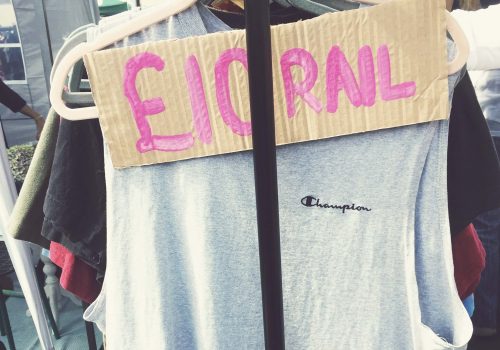
Sophie Tendyra
Co-Founder
If you’ve watched anything by David Attenborough recently, you’ll know the score on climate change. It’s bad, very bad. The images of ice caps melting, wildfires raging, and entire forests being chopped down, stay with us all way after we’ve switched off the TV.
If you’re like me, you might’ve even imagined a “maybe-future”, less like the world we know and more like the plot of a Cormac McCarthy novel (if you haven’t read The Road, read The Road, it’s brilliant).
We all know that things need to change, or else that maybe-future is going to become the actual-future. But, how?
Well, a good place to start is to take a look at your carbon footprint. You might not be able to see it, but it’s definitely there and it causes a whole lot of damage. Your footprint is made up of all the gases produced just by living your life – when you buy stuff, use stuff, throw away stuff. That all produces carbon dioxide and other nasty gases like methane and nitrous oxide. These gases rise into the sky, whirling above our heads and trapping heat in the atmosphere. And that trapped heat is what’s causing climate change.
You might have used Alter Eco already to offset your carbon footprint. If so, you’ve taken a big step to saving the world from climate change – you hero. But we’re not going to pretend that’s the whole solution – that would be way too easy. The absolute best way to stop harmful gases from damaging the atmosphere is to not produce them in the first place.
The average Brit’s carbon footprint is about 8 tonnes of carbon emissions per year*. If that sounds like a lot, it’s because it is – it’s more weighty than a fully grown elephant. It’s impossible to live an ‘average Joe’ life today and have no carbon footprint. But that footprint doesn’t have to be 8 tonnes – it could be a helluva lot less. We’re not expecting you to change your whole life – we get it – but there are lots of small changes you can make that’ll add up to a big difference.
Here's 5 tips to reduce your carbon footprint
#1 Ditch the cheeseburgers
Cows and the meat industry are a huge producer of carbon gases. Yeh, we know that beefburger is tempting, especially after a few beers, but try to resist the temptation. Think of the planet. There are some amazing meat-free burgers you can try, plenty of vegetarian or vegan recipes you can learn. If all else fails, chips are vegan.

#2 Wear a jumper
A lot of energy is wasted in our homes – heating and lighting them is a biggie. Just keep an eye on things – turn down the heat a couple of degrees and wear an extra hoodie, turn off the switches when not using them, and use LEDs rather than normal bulbs. If you can switch to a renewable energy provider, big brownie points.

#3 But not a fast fashion jumper
Vintage or upcycled clothes are a win here – pop some tags in your local charity shop. If you’re buying new clothes, go for natural rather than synthetic threads, think about buying what you can’t live without, and cut down maybe one thing a month – you can do it.

#4 Walk and bike
This is pretty simple – the more you can cycle or walk, the better. The more you use a car or fly, the worse. Try starting with one day a week if you can’t face wearing cycling lycras every day. And when you do need to use a car, go easy on the accelerator and brakes. Those flights to Europe for a weekend? Maybe do a Greta occasionally and think if you could take a train or boat instead.

#5 Use less plastic
Plastic takes up to 1000 years to decompose, and it’s especially bad for the oceans. Take your own tote bag shopping, browse markets for food with less packaging, and try compostable food bags. Those takeaway coffees? The disposable cups are often coated with plastic. Treat yourself sure, but remember your reusable cup.

Try making small changes – you’ll feel better for it – and get everyone you know involved. Mainly, remember the motto – do your best, and offset the rest. Together, we’ll stop the Cormac McCarthy plot turning into reality.
Let me know in the comments how you get on trying some of these, and pass on any other hot tips you have! Sharing is caring.






8 thoughts on “5 Tips to Clean Up Your Carbon Footprint”
Love this! Thank you 💕 Most of the way there but plastic is the most challenging one to cut out for me! Need to get myself some more compostable bags, great tip 🙂
Thanks Kristina! Great to know you’re most of the way there, that’s amazing. I agree, plastic is such a tough one, remembering to take a bag and a reusable cup is always is also one of my vices! But as long as we’re trying that’s half the battle 🙂 Keep it up.
I have started to use the refill station at a local grocer’s – shopping local and avoiding lots of unnecessary packaging. Lucky to have it nearby.
Nice work Olivia – those are exactly the everyday changes add up to a big difference! Great to hear.
I’m a bit rubbish at consistent efforts here , but ‘trying my best’, which is why I’m loving the alter-eco concept. I signed up for 100% renewable energy a few years ago for my utilities, but live in a 120-year-old house and getting hammered on cost. Any tips?!
Hi Gillian! Trying your best is definitely what matters… 70% is so much better than 0% and still makes a huge difference! Your house sounds amazing – actually I’m exactly the same and also live in a house that’s Victorian. We have put some insulation in our loft – it was pretty cheap and has made it so much warmer so we need the heating on less. There are also lots of other small tricks we’ve tried – we have a eco-shower head that uses less water, and energy saving lightbulbs too…it all adds up. Good luck and let us know how you get on!
Plastic reduction is tricky. I think the answer is to always be on the look out for small changes. Soap can replace shower gel and hand gel. You can also get face wash bars. Wooden toothbrushes. Keep bread bags and use them instead of clingfilm. Buy fruit and veg from greengrocers in paper bags. Rather than trying to do this all at once, it’s much easier to make small changes one by one.
Great tips here Jack. I think you’re bang on, it’s about accumulating new, sustainable habits one at a time rather than trying to do everything all at once. The latter is bound to lead to slipping back into your old behaviour sooner or later. I actually use a wooden toothbrush myself and find it to be just as good, if not better than a plastic one. And if you’re looking for something electric, companies like Georganics and Issa offer great sustainable products. Great tip on the bread bags, I hadn’t considered that one.